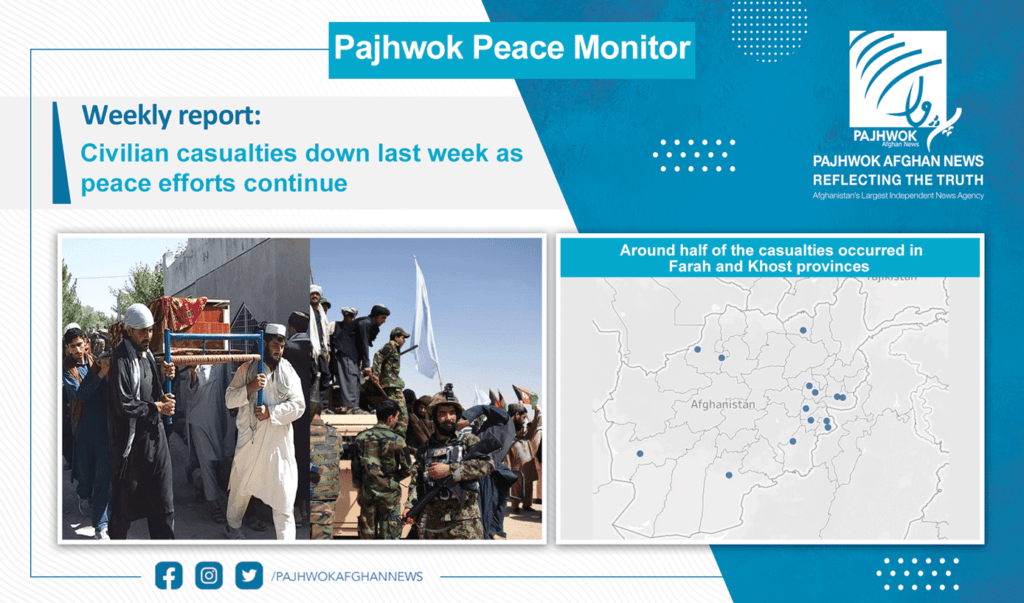KABUL (Pajhwok): Last week witnessed continued efforts for peace in Afghanistan, when civilian casualties declined compared to the past four weeks despite an uptick in incidents of violence.
Last week’s major developments:
- If Taliban don’t reconcile, America will stand with Afghans under republic umbrella
- NATO, EU and UK showed opposition to the establishment of government by force
- Troika Nations: Sanctions imposed on Taliban by UN should be reviewed
- Taliban: There is need for a strong Islamic System in Afghanistan
- Ahmad Masoud: If Taliban refused reconciliatory path, Mujahidin are ready for military steps
- In previous week 233 civilians were killed and injured but last week 63 civilians were killed and injured
Attacks and Civilian casualties:
Seven civilians were killed and 56 others injured in 14 attacks last week. The violent incidents happened in 10 provinces — Farah, Khost, Logar, Paktika, Kabul, Faryab, Kunduz, Nangarhar, Kandahar and Paktia. The government and the Taliban have not spoken about civilian casualties.
Reports show last week was deadly for security personnel. According to reports, security personnel and the Taliban suffered more casualties last week compared to previous weeks, but Pajhwok don’t share figures because credible information to support the figures are not available.
Peace Efforts:
US and NATO begins withdrawal of their troops from Afghanistan on May 1 and this process will be concluded by September 11. The Taliban, however, termed the extension in troop’s withdrawal period by four months against the Doha Agreement.
US officials made different statements, with some stressing a political settlement and said if the Taliban don’t reconcile, the US will support Afghans under the umbrella of republic.
But former US CIA Director David Howell Petraeus expressed concern over the Taliban’s return to power after the withdrawal of US forces. He said there is the possibility of Daesh return to the region after the pullout of foreign forces and this will only end US and NATO involvement in Afghanistan conflict.
Chairman of the US Joint Chiefs of Staff, Mark Milley said that the Taliban will not be able to win, but when asked about the ability of Afghan forces in absence of foreign troops, he said, “There are many possibilities.”
In a statement, special envoys and special delegates from the European Union, NATO, US and UK stressed acceleration of Afghan peace process and political settlement and said that they were against any type of government by force in Afghanistan.
Extended Troika including US, Russia, China and Pakistan in a meeting in Qatar last week stressed a political solution to the Afghan crisis and recommended the review of Taliban leaders’ removal from the UN blacklist. However, Taliban say that the UN blacklist against their leaders was the main barrier to the peace process.
Taliban also said that their representatives had talked with envoys of the United States, the United Nations, Germany, Italy, France, the United Kingdom, and Norway in a video conference on Friday about the Afghan peace process. Taliban said that they would release many Afghan prisoners before EidulFitr.
The movement stressed on the establishment of a ‘strong Islamic government’ and said that coalition governments formed from many political parties had failed.
Mohammad Naeem, spokesman of Taliban’s political office in Qatar said, “Islamic Emirate assures all foreign diplomats, journalists, human rights organizations that there would be no security threats to them in the next phase.” However, he did not provide details on the regard.
Efforts are on to hold Turkey conference on Afghanistan after Eid. ZalmaiKhalilzad last week traveled to Kabul and some regional countries and discussed new developments in the peace process.
High Council of National Reconciliation (HCNR) also said that efforts were on to hold the conference after Eid. However, some experts believe that the conference is less likely to take place after Eid considering the ongoing political situation in the country. Afghan government officials say that the Taliban had made preparations for war rather than peace despite there was no excuses left for the group to continue war after foreign forces announced withdrawal.
The government asked the international community to adjust their views about the Afghan peace based on new realities in Afghanistan.
Political parties, politicians and people’s activities about peace:
Ahmad Massoud, son of a former Jihadi commander Ahmad Shah Massoud, in a conference last week said that ‘Mujahideen’ would stand against the Taliban if the movement abandoned peace talks.
A number of residents of Paktia province said that ongoing violence by Taliban was not acceptable and the group should be brought under military pressure if it did not shun the current way. Hundreds of people in Kunar and Herat provinces organized gatherings in support of peace and ceasefire. A number of people in Balkh province asked Taliban and the government to be careful about civilian lives during the conflict.
Nh/mds/ma








GET IN TOUCH
NEWSLETTER
SUGGEST A STORY
PAJHWOK MOBILE APP